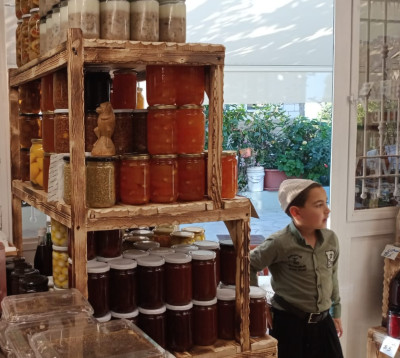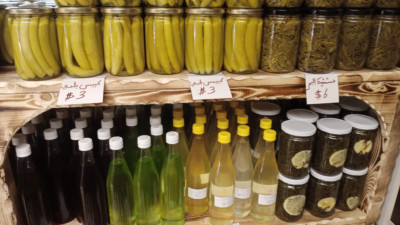Mûneh
 “The mûneh – from the verb mâna: to supply – designates all the provisions obtained by traditional conservation techniques. These provisions are made up during the summer to be consumed in the winter. Because in the traditional rural economy of Lebanon, food is mainly produced in summer and the peasants keep it in order to extend their availability to other seasons, when food is scarce. When a family shares a meal in winter, several dishes served are prepared from mûné. Mûné is therefore a fundamental aspect of the peasant diet.
“The mûneh – from the verb mâna: to supply – designates all the provisions obtained by traditional conservation techniques. These provisions are made up during the summer to be consumed in the winter. Because in the traditional rural economy of Lebanon, food is mainly produced in summer and the peasants keep it in order to extend their availability to other seasons, when food is scarce. When a family shares a meal in winter, several dishes served are prepared from mûné. Mûné is therefore a fundamental aspect of the peasant diet.
 Thus, mûne is a preservation process involving operations and techniques aimed at transforming perishable foods into durable foods” (Kanafani-Zahar A., 1994). The preservation methods, transmitted from generation to generation, are fermentation, sun drying, concentration by evaporation, brining, distillation and preservation in olive oil and fruit sugar.
Thus, mûne is a preservation process involving operations and techniques aimed at transforming perishable foods into durable foods” (Kanafani-Zahar A., 1994). The preservation methods, transmitted from generation to generation, are fermentation, sun drying, concentration by evaporation, brining, distillation and preservation in olive oil and fruit sugar.
“Brought to fermentation, the milk gives cheese and the vegetables, pickles and preserves in oil; grains, fruits, vegetables, herbs and nuts are sun-dried; a fermented mixture of wheat and milk gives kisk; finally the vegetables, fruits and meat are reduced to give concentrates, syrups, jams, raisinés and awarma” (Kanafani-Zahar A., 1994).
The varieties of mûneh differ from one region to another and from one village to another depending on the availability of basic products: fruits, vegetables, cereals, milk and meat.
“The mûneh is the result of cooperative work involving family, friends and neighbours. The role of women is decisive in the processing and storage of preserved products as well as in the management of reserves. “If the production of food is an activity common to men and women, the preparation and storage of the mine is the responsibility of the latter. It is they who, through their activity, provide the family food” (Kanafani-Zahar A., 1994).
In the past, rural families produced mine for their own consumption and sold the surplus to city dweller. Due to the successive crises: financial and economic, then Corona, then the port explosion, leading to the current political crisis, the industrial sectors collapsed and the institutions closed causing the loss of nearly 35% of their businesses and jobs. Many women from rural origin, being victims of this wave of layoffs, returned to their villages and to the preparation of mûne. Also, in response to an emergency and as a temporary remedy, this know how was transferred to urban communities.

